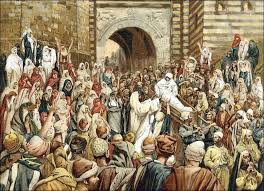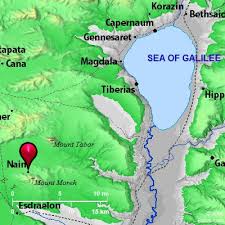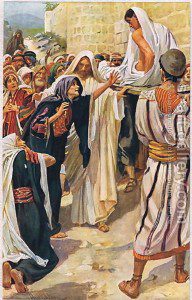“By the sweat of your face
you shall eat bread,
till you return to the ground,
for out of it you were taken;
for you are dust,
and to dust you shall return.” – Genesis 3:19
 Had a rough day at work? Or maybe you have had a tough time finding work. Do you find as many women and teens in the workplace sweating to win the bread of this world?
Had a rough day at work? Or maybe you have had a tough time finding work. Do you find as many women and teens in the workplace sweating to win the bread of this world?
It is the result of sin. Punishment. We are not just a caretaker in the pleasant garden anymore, but God has cursed the ground where we must make our living and sustain our wives and children.

 Yes, even the wife with the jobs of the household and mother of the children complains of her sweat of the job where two incomes will not even provide the bread that once only the husband would sacrifice his sweat for his loved ones.
Yes, even the wife with the jobs of the household and mother of the children complains of her sweat of the job where two incomes will not even provide the bread that once only the husband would sacrifice his sweat for his loved ones.
Even now some women will choose this curse over obedience to a husband and obedience to God. Teens with cars and cell phones and money for entertainment compete with Godly and ungodly family men in the marketplace of jobs, while they boast that they are “in a relationship” with another teen (an evil sexual relationship outside of marriage and responsibility of a God-led family).
We have wandered far from Paradise. Many have run far from obedience to God’s will.
Where did the journey of sin begin after original sin?
Genesis gives us an insight as we observe a conversation between God the Trinity. (We will not dwell on the Trinity, the plurality of the One God at this point; yet hear God’s motive to expel mankind from Paradise.)
Genesis 3:22 Then the Lord God said, “Behold, the man has become like one of us in knowing good and evil.
Adam and Eve have become like Jehovah Elohim: like God the Father; like Jesus when He would later walk the earth as the second adam; like the Holy Spirit, the Life of the soul. yada`yada`yada` – Knowing, knowing, knowing good and evil.
Gen. 3:22b Now, lest he reach out his hand and take also of the tree of life and eat, and live forever—” 23 therefore the Lord God sent him out from the garden of Eden to work the ground from which he was taken. 24 He drove out the man, and at the east of the garden of Eden he placed the cherubim and a flaming sword that turned every way to guard the way to the tree of life.
God IS.
This is representation of eternal life with no beginning and no end.
God created.
This is representation of life with a beginning (man or animal, plant or mineral).
Does the life of an animal have an end?
Did God intend for man, created in His Image, to have a life that would end?
The soul and life of Man is connected to God through God’s Fatherly act of creation.
Hear God’s words to the Prophet Jeremiah [1:5]:
“Before I formed you in the womb I knew you,
and before you were born I consecrated you;
I appointed you a prophet to the nations.”
We are sons and daughters of God! We have a beginning in Him. God intended for us to remain as faithful children of His heavenly family. For His children He created Paradise on Earth. Adam, before sin, could have remained in Eden.
What is the concern of God at this point?
It is that evil could live on. Evil could have life eternal.
In the beginning, God created… and it was good.
Evil must NOT have eternal life!
How often does the Bible warn of a mortal man: “… and he did evil in the sight of the Lord?”
Evil souls and evil men must be banished from the good of God!
“Behold, the man has become like one of Us, to know good and evil. And now, lest he put out his hand and take also of the tree of life, and eat, and live forever”—
Did the Lord God not caution: “or you will surely die?”
So he drove out the man; and he placed at the east of the garden of Eden Cherubims, and a flaming sword which turned every way, to keep the way of the tree of life. – Genesis 3:24 KJV
 Twentieth Century author, John Steinbeck, focuses on this in his (1952) novel about a family and their attitudes toward work in “East of Eden.” We have choices, knowing good and evil.
Twentieth Century author, John Steinbeck, focuses on this in his (1952) novel about a family and their attitudes toward work in “East of Eden.” We have choices, knowing good and evil.
Therefore God has guarded the gates of righteousness against the entry of evil men.
The Cherubim, also creatures of God’s creation (but not for this earth), serve God. Angels (yet not all angels, for some rebelled to follow Satan) serve God.
Mankind, but not all men and women, serves God (as best we can in this sinful mortal flesh).
God had a relationship with man. Man had a relationship with God.
God restored the relationship of righteousness, that we might once more have eternal life in relationship in the family of God our Father. He restored life to our souls by the Living Sacrifice of the Blood of Christ Jesus, Son of God, on the Cross.
We have been banned in the nakedness of our many sins to a land east of Eden, dust beneath the feet of our descendants, and struggle of the sweat of our brow to remain in relationship with God and each other.
The challenge of the grace of Christ is that it requires the harvest of our faith. Faith requires obedience.
Jesus IS Lord.
Do you believe this?



 Luke 7:11 Soon afterward he went to a town called Nain, and his disciples and a great crowd went with him.
Luke 7:11 Soon afterward he went to a town called Nain, and his disciples and a great crowd went with him. And he said, “Young man, I say to you,arise.” 15 And the dead man sat up and began to speak, and Jesus gave him to his mother.
And he said, “Young man, I say to you,arise.” 15 And the dead man sat up and began to speak, and Jesus gave him to his mother. 8 One day Elisha went on to Shunem, where a wealthy woman lived, who urged him to eat some food. So whenever he passed that way, he would turn in there to eat food.
8 One day Elisha went on to Shunem, where a wealthy woman lived, who urged him to eat some food. So whenever he passed that way, he would turn in there to eat food.